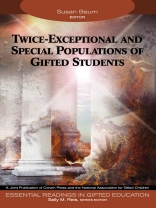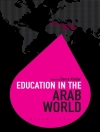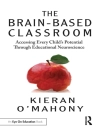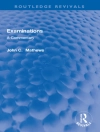The expert guide to meeting the needs of twice-exceptional and other at-risk gifted students!
Special learning needs, cultural expectations, and issues of poverty greatly complicate the identification of gifts and talents among at-risk students. And traditional gifted programs fail to fully address the unique needs of these special populations. Twice-Exceptional and Special Populations of Gifted Students offers critical insights and promising practices designed to prevent these high-potential, at-risk students from falling through the cracks.
Key features include:
- Susan Baum′s thorough synopsis of the critical issues affecting twice-exceptional students and other special gifted populations
- Strategies for identifying giftedness masked by gender, cultural, economic, and/or behavioral issues
- Examples of appropriate programming options for a variety of high-potential, at-risk populations
Applying the modifications, accommodations, and additional services suggested in this ready-reference, educators will at last be able to adequately nurture the academic, social, and emotional development of twice-exceptional and other special populations of gifted students.
The ERGE Series:
The National Association for Gifted Children series Essential Readings in Gifted Education is a 12-volume collection of seminal articles from Gifted Child Quarterly. Put the knowledge and power of more than 25 years of research on giftedness and talent into your hands with the leading theories, studies, and findings the experts in the field have to offer.
Table of Content
About the Editors
Series Introduction – Sally M. Reis
Introduction to Twice-Exceptional and Special Populations of Gifted Students – Susan Baum
1. An Enrichment Program for Gifted Learning Disabled Students – Susan Baum
2. Compensation Strategies Used by High-Ability Students With Learning Disabilities Who Succeed in College – Sally M. Reis, Joan M. Mc Guire, and Terry W. Neu
3. Gifted Students With Attention Deficits: Fact and/or Fiction? Or, Can We See the Forest for the Trees? – Susan Baum, F. Richard Olenchak, and Steven V. Owen
4. Gifted Children With Asperger′s Syndrome – Maureen Neihart
5. We Can′t Change What We Don′t Recognize: Understanding the Special Needs of Gifted Females – Sally M. Reis
6. Gifted and Gay: A Study of the Adolescent Experience – Jean Sunde Peterson, Heather Rischar
7. The Rural Gifted Child – Howard H. Spicker, W. Thomas Southern, and Beverly I. Davis
8. Gifted Dropouts: The Who and the Why – Joseph S. Renzulli, Sunghee Park
Index
About the author
Sally M. Reis is a professor and the department head of the Educational Psychology Department at the University of Connecticut where she also serves as principal investigator of the National Research Center on the Gifted and Talented. She was a teacher for 15 years, 11 of which were spent working with gifted students on the elementary, junior high, and high school levels. She has authored more than 130 articles, 9 books, 40 book chapters, and numerous monographs and technical reports. Her research interests are related to special populations of gifted and tal-ented students, including: students with learning disabilities, gifted females and diverse groups of talented students. She is also interested in extensions of the Schoolwide Enrichment Model for both gifted and talented students and as a way to expand offerings and provide general enrichment to identify talents and potentials in students who have not been previously identified as gifted. She has traveled extensively conducting workshops and providing profes-sional development for school districts on gifted education, enrichment programs, and talent development programs. She is co-author of The Schoolwide Enrichment Model, The Secondary Triad Model, Dilemmas in Talent Development in the Middle Years, and a book published in 1998 about women’s talent development titled Work Left Undone: Choices and Compromises of Talented Females. Sally serves on several editorial boards, including the Gifted Child Quarterly, and is a past president of the National Association for Gifted Children.












